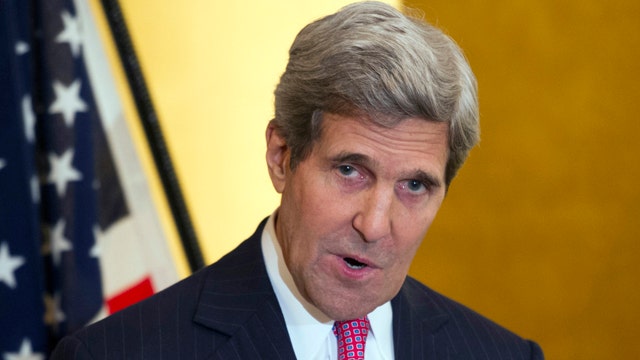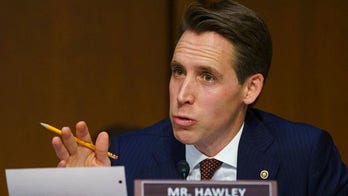Secretary Kerry: More sanctions on Iran would be a 'mistake'
Reaction from Fox News contributor Lisa Daftari
Israeli Prime Minister Benjamin Netanyahu said on Wednesday that a "bad deal" between Iran and international negotiators seeking to prevent Tehran from being able to assemble an atomic weapons arsenal could lead to war.
Addressing Israel's parliament in Jerusalem, Netanyahu said continued economic pressure on Iran was the best alternative to two other options, which he described as a bad deal and military action, Reuters and The Jerusalem Post reported.
"I would go so far as to say that a bad deal could lead to the second, undesired option," Netanyahu said, referring to war. "Iran is under great economic pressure and the advantage is with those who are pressing. There is no reason to give in to Iran's demands now."
Netanyahu's comments came as the Obama administration faced skepticism from members of Congress over efforts to strike a nuclear pact. Both Obama and Netanyahu have repeatedly warned Iran about the potential for military action if negotiations fail. The allies differ, however, over how any diplomatic solution should look.
Secretary of State John Kerry warned Congress Wednesday against scuttling a historic opportunity for a nuclear pact with Iran by pressing ahead with new sanctions while international negotiators seek to prevent Tehran from being able to assemble an atomic weapons arsenal.
At a House Foreign Affairs Committee hearing Wednesday, Democratic and Republican lawmakers sharply criticized Kerry and other senior U.S. officials for their offer during last week's inconclusive negotiations.
"The Iranian regime hasn't paused its nuclear program," lamented Rep. Ed Royce, R-Calif., the House Foreign Affairs Committee chairman. "Why should we pause our sanctions efforts as the administration is pressuring Congress to do?"
Kerry, said new action now from U.S. lawmakers could shatter an international coalition made up of countries with interests as divergent as France, Russia and China, endangering hopes for a peaceful end to the decade-long nuclear standoff with the Islamic republic.
"We put these sanctions in place in order to be able to put us in the strongest position possible to be able to negotiate. We now are negotiating," Kerry told reporters ahead of testifying before the hearing. "And the risk is that if Congress were to unilaterally move to raise sanctions, it could break faith in those negotiations, and actually stop them and break them apart."
With nuclear negotiations set to resume in Switzerland next week, the Obama administration dispatched Kerry and Vice President Joe Biden to Capitol Hill on Wednesday to seek more time for diplomacy. They faced skepticism from members of Congress determined to further squeeze the Iranian economy and wary of yielding any ground to Iran in the talks.
Positions are more mixed in the Senate. After briefing the Banking Committee, Kerry and Biden gathered behind closed doors with Senate Democratic leaders to explain the administration's strategy. No Democratic leader left the meeting contradicting the administration's call for caution on sanctions.
Initially, the Obama administration offered Iran the opportunity to recoup some of the billions of dollars in frozen overseas assets if the country started the process of shutting down its nuclear program.
The White House also said that the most severe sanctions would remain in place until the country is able to convince the world it is not trying to assemble a nuclear arsenal.
Many experts believe that in order to strike a deal with Iran diplomatically, the international community will have to ease economic sanctions against Tehran.
Kerry said negotiators should have a "few weeks" more to see if they can reach an agreement. The State Department's nuclear negotiator, Wendy Sherman, and the Treasury Department's sanctions chief, David Cohen, also joined him at the Capitol.
Iran insists its program is solely for peaceful energy production and medical research purposes, but until recently had offered little to assuage Western and regional fears that it was secretly trying to develop atomic bombs.
Some in Congress are gearing up for a fight with the administration over the new sanctions, which were overwhelmingly approved by the GOP-led House in July. The legislation blacklisted Iran's mining and construction sectors and committed the U.S. to the goal of eliminating all Iranian oil exports worldwide by 2015. If the Senate Banking Committee pushes off its parallel bill any longer, lawmakers could attach it to a Senate defense bill which could come up for debate as early as Thursday.
Sen. Dick Durbin, the No. 2-ranked Senate Democrat, told The Associated Press he supported delaying action on further sanctions as long as diplomatic progress was being made.
Sen. Bob Corker, the Senate Foreign Relations Committee's top Republican, also sounded conciliatory. He said his focus was on maintaining existing restrictions on Iran's economy so the U.S. keeps its negotiating leverage. But Chairman Sen. Robert Menendez, D-N.J., has called this week for tougher sanctions as an incentive for negotiations. And many Republicans back him.
"We ought to be actually ratcheting up the sanctions against Iran," Senate Minority Leader Mitch McConnell, R-Ky., said. "What the administration was promoting is something the Israelis think is a bad deal for them. It's pretty clear the Sunni Arab allies of ours also think it's a bad deal. Looking at it strictly from an American point of view, I think it's a bad deal as well."
Sen. Ted Cruz, R-Texas, called the plan on the table a “terrible deal.”
"It wouldn't stop Iran from developing nuclear weapons, it lets them keep their centrifuges, keep their enriched uranium. That was a mistake,” he told Fox News.
The Israeli Embassy told FoxNews.com Wednesday they were taking a wait-and-see stance and are deferring all comments to Netanyahu.
Last week's talks came tantalizingly close to an accord. They broke down as Iran demanded formal recognition of what it calls its right to enrich uranium, and as France sought stricter limits on Iran's ability to make nuclear fuel and on its heavy water reactor to produce plutonium, diplomats said.
Obama spoke Wednesday by telephone with French President Francois Hollande. The two countries "are in full agreement" on Iran, the White House said in a statement.
Fox News' Barnini Chakraborty and The Associated Press contributed to this report.





